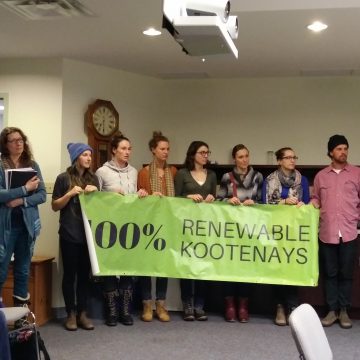The West Kootenay EcoSociety is asking the City of Trail to become the 13th local government in the Kootenays to pledge to switch to using only renewable energy by 2050.
Executive director Montana Burgess made the request last week. Council has asked its staff to look into it and will make a decision at a later meeting.
Burgess noted that Rossland, Fruitvale, Warfield, and Castlegar are among the communities who have agreed to make the transition.
She said Trail is already well on its way to lowering its carbon footprint, including a recent active transportation planning initiative, building the Columbia River Skywalk pedestrian bridge, battery recycling programs, electric vehicle charging stations, energy upgrades at the Trail Memorial Centre, and the forthcoming regional composting program.
Burgess explained in an email after the presentation that the society has not previously approached Trail.
“When we came to council, we wanted to make sure we knew there was clear community support for this,” she said. “Almost 1,000 residents have said they support this, which we’ve learned by having over 1,000 conversations with community members at their door steps, on the phone and at community events.
“I think with the common sense approach of an energy transition that is frankly already underway, with the opportunities on the table for Trail to formalize its involvement, as well as with the clear community support, it’s a big win for the Trail council to intentionally say yes to the 100 per cent renewable energy transition.”
Councillor Robert Cacchioni said one of the major challenges to meeting that target will be switching the nine-vehicle transit fleet over to electric buses at a cost of $1.25 million each. The city is on the hook for about half the cost, which he said will be “difficult for the local economy to absorb.”
“We’re looking at balancing cost with implementation,” he said. “We’re already providing way more transit services than anywhere in rural BC.”
Councillor Colleen Jones said she was “all in favor” of looking at projects with a climate change lens, which is “important for the health and safety of the community.”






